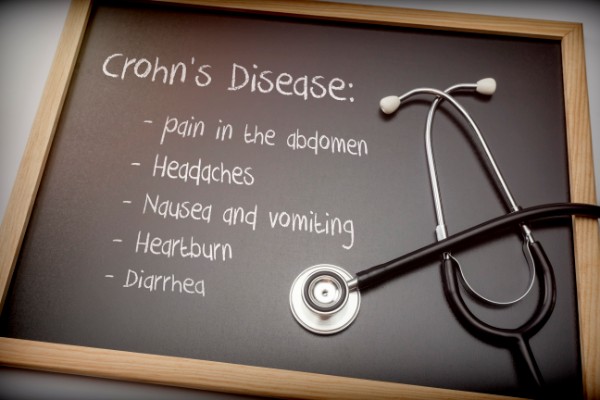We’ve all experienced occasional stomach upset or distress – whether it’s caused by a virus, stress or just eating something that didn’t quite agree with us. But for nearly 3 million adults in the U.S., they’re dealing with gastrointestinal issues that go far beyond an upset stomach.
“Crohn’s disease does more than cause physical symptoms,” says William Hackworth, M.D., gastroenterologist with Riverside Health. “It can also create emotional and mental stress for the individuals diagnosed with the condition. The first step is understanding the disease and how patients can take back control of their health.”
Dr. Hackworth encourages patients and their families to learn more about Crohn’s disease to be better informed and empowered in creating a care plan that’s right for them.
What is Crohn’s disease?
Crohn’s disease is an inflammatory bowel disease. When the inflammation spreads deep into bowel tissue, it can be very painful and may even lead to life-threatening complications.
“Different areas of the digestive tract can be affected by Crohn’s disease and the severity of the disease can vary greatly by individuals,” explains Dr. Hackworth. “But, with the right diagnosis and treatment, you can find relief from your symptoms.”
What causes Crohn’s disease?
Researchers continue to study Crohn’s disease today, but still aren’t sure what causes it. While we used to believe it was caused by diet and stress, we now know these factors only aggravate its symptoms.
One suspected cause may be an abnormal reaction of the immune system to a virus or bacterium. Genetics may also play a role.
What are the symptoms of Crohn’s disease?
Crohn’s disease symptoms can vary greatly between individuals based on the severity and location of inflammation and can appear gradually. Some individuals also experience remission – when they don’t have any symptoms.
The most common symptoms of Crohn’s disease include:
- Diarrhea
- Fever
- Fatigue
- Abdominal pain and cramping
- Bloody stool
- Mouth sores
- Pain or drainage around the anus
- Fistulas (tunnel into the skin from the anus)
Severe symptoms include:
- Skin, eyes and joint inflammation
- Liver or bile duct inflammation
- Delayed growth or sexual development (in children)
Who is at risk for developing Crohn’s disease?
Certain risk factors may increase your risk of developing Crohn’s disease. The most common include:
- Age. Most people are diagnosed with Crohn’s disease before they’re 30 years old.
- Ethnicity. White people are at higher risk of developing Crohn’s, including people of Eastern European (Ashkenazi) Jewish descent. Rates of Crohn’s disease are rising among black individuals in North America and the United Kingdom.
- Family history. If a parent, sibling or child has Crohn’s disease, you may be at higher risk of developing the condition.
- Tobacco use. Cigarette smokers are at higher risk of Crohn’s disease.
- Nonsteroidal anti-inflammatory medicine. Prolonged use of ibuprofen (Advil), naproxen sodium (Aleve), diclofenac sodium (Voltaren) and other anti-inflammatory medications can make Crohn’s disease worse.
- Residing in an urban or industrial area. You may be at higher risk if you live in a city or industrialized country.
- Diet. A diet high in fat and refined foods may also lead to an increased risk of Crohn’s disease.
Crohn’s disease diagnosis and treatment
It’s important to have Crohn’s disease diagnosed and treated as it can lead to serious complications. Your doctor will complete a physical exam and may order additional testing, such as:
- Blood tests
- Colonoscopy
- Computerized tomography scan
- Magnetic resonance imaging
- Capsule endoscopy
- Balloon-assisted enteroscopyh
“Once you have an accurate diagnosis, you and your doctor can create a treatment plan that addresses your symptoms and helps you feel better,” says Dr. Hackworth.
Treatment for Crohn’s disease may include:
- Medication, including anti-inflammatory drugs (such as corticosteroids), immune system suppressors and antibiotics. Your doctor may also recommend medication to relieve symptoms of Crohn’s disease, like antidiarrheals, pain relievers and iron supplements.
- Nutrition therapy, guided by your physician or registered dietitian, is an important part of managing Crohn’s disease and its symptoms.
- Surgery to remove the inflamed area of the intestine or treat complications from the disease.
Can Crohn’s disease be prevented?
Crohn’s disease can’t be prevented, but there are steps you can take to manage your condition and minimize symptoms.
“Your provider is an important partner in managing your Crohn’s disease,” says Dr. Hackworth. “Together, you can find what works well for you, which can take some trial and error. Be consistent and persistent and you will find some control over the condition.”
Some common ways to help manage Crohn’s disease and reduce flare-ups include:
- Keep a diary to track what food and drink triggers symptoms.
- Limit dairy.
- Avoid high-fat foods.
- Watch your fiber intake.
- Eat more frequent, smaller meals.
- Drink lots of water.
- Take a multivitamin.
- Get plenty of exercise.
- Quit smoking.
- Find ways to manage stress.
If you’re struggling to manage your Crohn’s disease, talk to your doctor today. Find a Riverside gastroenterology provider near you.



